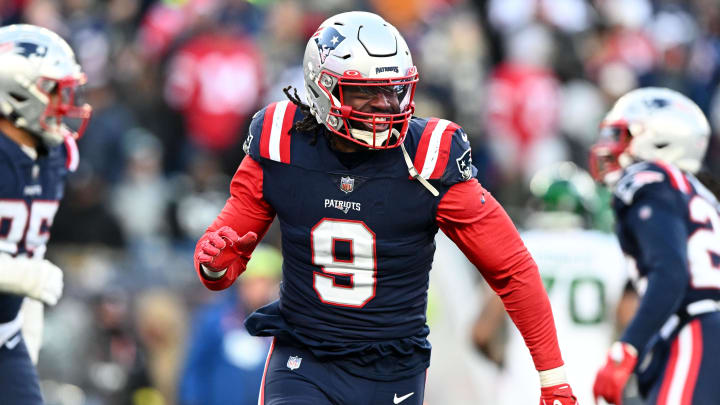Pros, Cons of Falcons Trading for Patriots Pass Rusher Matthew Judon

The Atlanta Falcons made a substantial trade Wednesday night, landing New England Patriots pass rusher Matthew Judon in exchange for a 2025 third-round pick.
Judon has been one of the NFL's best pass rushers in recent years, receiving Pro Bowl bids from 2019-22. He was stellar in 2021-22, totaling 28 sacks and 53 quarterback hits while playing in all 34 games.
In 2023, he had four sacks in as many games and appeared on pace for another strong campaign before tearing his lower right bicep in a Week 4 loss to the Dallas Cowboys, which proved to be his final appearance of the season.
For his career, the 6-foot-3, 270-pound Judon has compiled 66.5 sacks, 87 tackles for loss and 165 quarterback hits across 114 games. He's entering his ninth year as a professional.
Judon, by all accounts, is a premier edge rusher -- and while his acquisition comes with many pros, there are also a few cons. Here's a look at both sides of the coin ...
Pros
1. He's Matthew Judon
Some things don't need much more context. Judon, as his numbers illustrate, is a high-level pass rusher who gives the Falcons an element they have not had up front in several years.
Vic Beasley is the last Falcon to produce a double-digit sack season, notching 15.5 in 2016. Judon has two in his last two full campaigns. He's the tone-setting, game-changing piece Atlanta has spent years searching for.
2. More Room for Jarrett, Onyemata
Throughout the summer, the Falcons' interior defensive line has impressed. Defensive tackles Grady Jarrett and David Onyemata headline the group, and their jobs become much easier with Judon in the fold.
Now that Atlanta has a formidable presence off the edge, offensive lines have to decide who they want to block one-on-one -- and there's a real chance space opens up for Jarrett and Onyemata, two strong pressure players inside.
3. A Mentor for Ebiketie
Before acquiring Judon, the Falcons appeared set to bank on a stellar season from 2022 second-round outside linebacker Arnold Ebiketie, who finished third on the team with six sacks last year.
But with Judon taking over the responsibility of being the bell-cow pass rusher, Ebiketie gets to learn from one of the game's best, all the while demanding less attention from opposing offensive lines.
Ebiketie saw extensive work as a designated pass rusher on third down in training camp, and the addition of Judon shouldn't change that. The move should, by all accounts, be a positive for the 25-year-old.
4. Judon Helps the Falcons Win ... Now
After giving quarterback Kirk Cousins a four-year, $180 million contract with $90 million guaranteed over the first two years, the Falcons appeared committed to winning in 2024.
Then, instead of adding help to the pass rush or secondary, Atlanta selected Cousins's successor, Michael Penix Jr., at No. 8 overall in April's draft.
But with Judon brought in to enhance the pass rush, the Falcons' odds of contending not only for the NFC South crown but an extended postseason stay are significantly higher -- and are more reflective of the team that dished out such a deal to Cousins five months ago.
5. Fontenot's Lack of Round 3 Success
In some cases, moving on from draft picks can be difficult, as teams rue the opportunity cost -- but for Falcons general manager Terry Fontenot, the third round has largely proven unproductive.
To date, Fontenot has selected guard Jalen Mayfield (cut), quarterback Desmond Ridder (traded), outside linebacker DeAngelo Malone (on roster bubble), defensive end Zach Harrison (ascending player) and rookie outside linebacker Bralen Trice (suffered season-ending torn ACL against the Miami Dolphins in the preseason opener).
The verdict on the first three appears to be out, and Atlanta will not know about Trice until next year. Harrison is an encouraging piece who the Falcons have high hopes for, but to have just one impactful player of five drafted in Round 3 over a four-year span is far from ideal.
And in this case, Atlanta gets a proven commodity who should produce at a clip that lessens any concerns about opportunity cost.
Cons
1. Age + Injury Return
Judon turned 32 years old Tuesday, and he's coming off a torn right lower bicep that caused him to miss the final 13 games last season.
However, prior to the bicep injury, Judon had played in all 17 games each of the prior two seasons and had missed just four total regular season contests in the first seven years of his career.
2. Contract -- Is Judon a Rental?
Contractual disagreements are why Judon is out of New England to begin with. He's making $6.5 million this season, according to OverTheCap, and his productivity and impact say he's worth much more.
The Patriots didn't want to pay the price Judon and his representation aspires to receive -- a number that remains unspecified.
Will the Falcons be willing to pay it? Only time will tell, but if not, Judon becomes a one-year rental. Of course, there's nothing overtly wrong with that, especially if he delivers in his lone season, but that's where the topic of opportunity cost emerges once again.
Final Verdict
Judon, with his veteran leadership and proven production, is the type of player the Falcons have long lacked. His arrival comes at the right time for a team with playoff aspirations and an otherwise glaring question at outside linebacker.
And so, while uncertainty exists around how much Judon has left in the tank, how much -- if at all -- his bicep injury affects his play and whether he'll be in Atlanta long-term, the fact remains this: Judon is a substantial upgrade at a reasonable cost, making the move highly sensical for Fontenot and staff.
